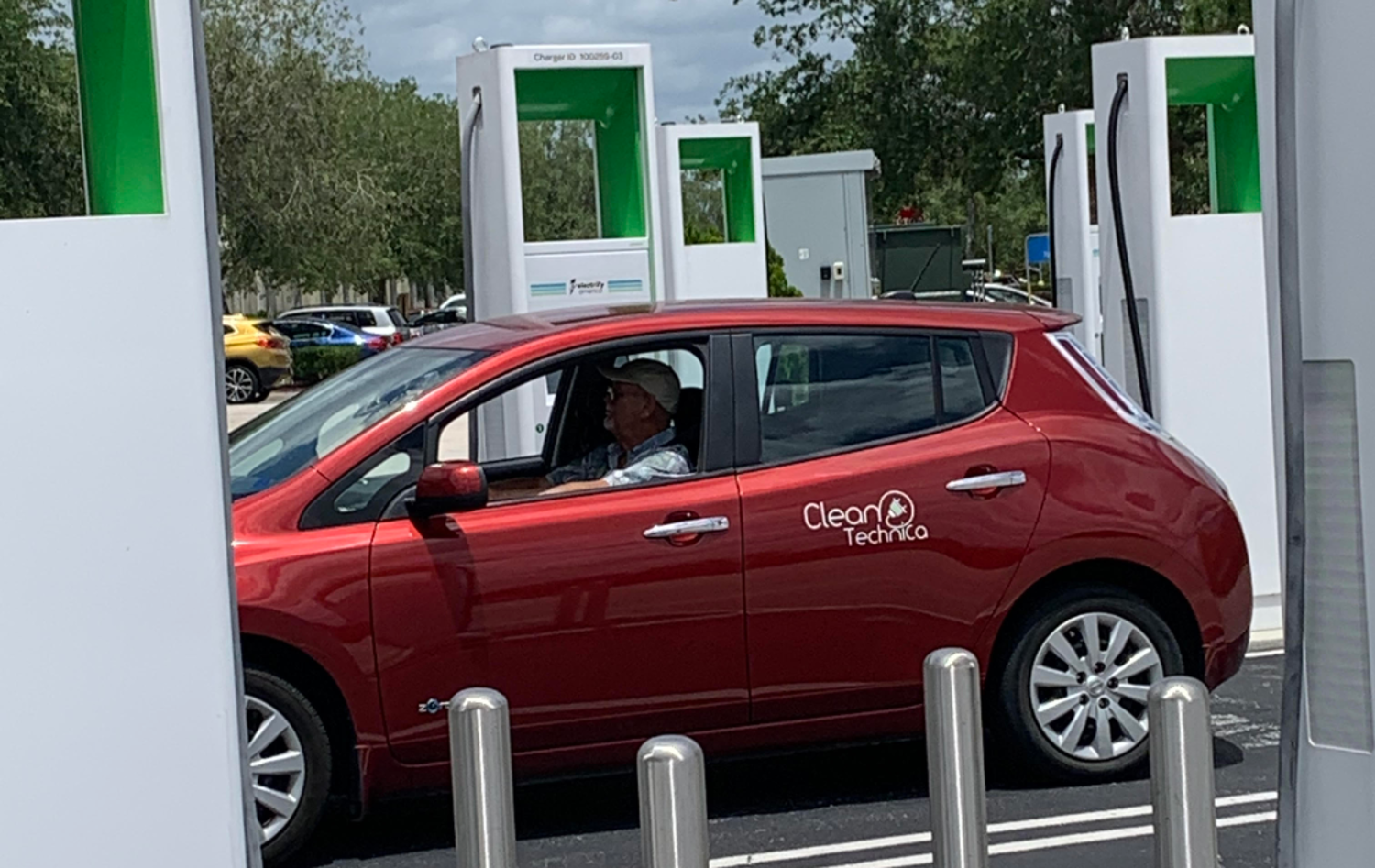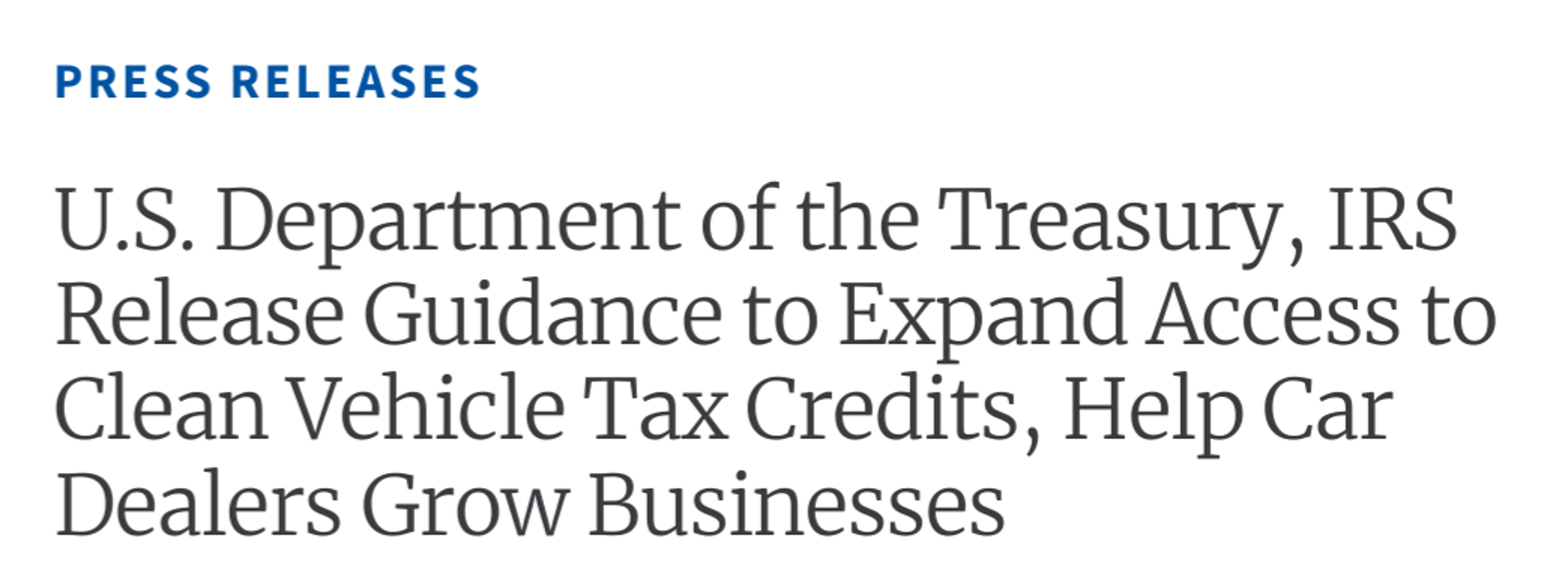Sign up for daily news updates from CleanTechnica on email. Or follow us on Google News!
When the Inflation Reduction Act was passed in August, 2022, it changed the existing federal EV tax credit in important ways. First, it split the credit into two parts — battery materials and battery components. Both have to be sourced either within North America or from a country approved by the Treasury Department (basically any country not China). Second, it required that final assembly of the vehicle take place in North America.
Those were the rules for vehicles. Then there was a separate set of rules for those who bought or leased an electric car. They had to meet income restrictions — no incentives for billionaires — and they had to owe enough in federal taxes to qualify for the maximum EV tax credit. If your tax liability for the year was $2000, then $2000 was all the benefit you could get.
If you had no tax liability, you got bupkis, which means those who needed the tax credit the most were shut out. In addition, unlike most tax credits, you had to use it all in one tax year or lose the unused portion. There was no rollover of the unused portion to the next tax year allowed.
Federal EV Tax Credit — Part Deux
There were a lot of issues with the original federal EV tax credit. How was the customer to know where GigataMotors got its battery materials or components from? If someone bought an EV in January, they got no benefit from the credit until they filed the federal tax return the following year. Navigating the system was confusing for many (including lots of dealers). People who are confused often postpone buying decisions until they gain a clearer understanding of the situation.
For EV customers, everything changes on January 1, 2024. The Treasury Department has now issued new rules that will turn the federal EV tax credit into what is basically a point of sale rebate. The new regs, published October 6, 2023, bring happy news for EV buyers.
“Under the Inflation Reduction Act, consumers can choose to transfer their new clean vehicle credit of up to $7,500 and their previously owned clean vehicle credit of up to $4,000 to a car dealer starting January 1, 2024. This will effectively lower the vehicle’s purchase price by providing consumers with an upfront down payment on their clean vehicle at the point of sale, rather, without having to wait to claim their credit on their tax return the next year. Only vehicles purchased under the consumer clean vehicle credits are eligible for this benefit.”
The new rules place a lot more of the burden on dealers, who will report sales to the IRS directly and get reimbursed for the amount of the credit within 72 hours. Here’s the part that will have the biggest impact on buyers. “Eligible consumers may transfer the full value of the new or previously owned vehicle credit regardless of their individual tax liability.” (Emphasis added.)
There’s another huge advantage for buyers here. Previously the full amount of the sale had to be paid or financed up front, while the benefit came in the following tax year. Now the credit is applied at the time of sale, which should lower the amount financed significantly and therefore lower a customer’s monthly payment. That’s really good news for low income shoppers who typically pay the highest interest rates on loans.
“To provide clarity and certainty, the dealer will provide buyers with required disclosures as part of the credit transfer and electronic time-of-sale submission process and with written confirmation that the vehicle they’re buying is eligible for a credit and the credit amount,” the IRS says.
“Later this month, dealers will be able to register via IRS Energy Credits Online, a new website. This registration is a requirement for dealers to offer consumers clean energy tax credits for qualifying electrified products. Starting in January, registered dealers will be able to submit clean vehicle sales information to the IRS and promptly receive payment for transferred credits. Energy Credits Online demonstrates the IRS’ commitment to delivering a world-class customer service experience and helping taxpayers receive the credits and deductions they are eligible for.”
EV Tax Credits As Congress Intended
NPR reports the new system announced last week is how Congress wanted the incentives to work when they passed them as part of the Inflation Reduction Act. But when it was rolled out last year, it still required EV buyers to claim their credit when they filed their taxes, a more burdensome route. That’s because the IRS needed time to come up with a new system to make the credits work as point-of-sale rebates instead.
The price and income limits included in the IRA still apply. Sedans and wagons are limited to a sales price of $55,000. The price of SUVs and light trucks is limited to $80,000. The income limits for a new vehicle are $150,000 adjusted gross income for an individual, $225,000 for a head of household, and $300,000 for a married couple filing jointly or a surviving spouse.

Photo by Carolyn Fortuna / CleanTechnica
For used cars, the income limits are $75,000 for an individual, $112,500 for a head of household, and $150,000 for a married couple filing jointly or a surviving spouse. The maximum sale price of a used car has to be less than $25,000 and the credit is limited to 30% of the sale price or $4000, whichever is lower.
Now if you are a low wage worker with little to no tax liability, you can purchase that qualifying used LEAF or Chevy Bolt and get the full $4,000 used EV federal tax credit taken right off the price. Previously, those customers got nothing.
Also, a particular car can only be eligible for the used EV tax credit once. If that 2015 Nissan LEAF you are looking at on a dealer’s lot has already qualified for the credit previously, it can’t qualify again. The burden is on dealers to inform customers whether a used EV is eligible, which should be an easy thing to do, since there is a government website they can access to get that information by submitting the VIN number.
But when my wife and I bought a used Chevy Bolt earlier this year, we had to tell the dealer about this and walk the staff through the process. Fortunately, we knew more about the process than the dealer, but not everyone will have that information at their fingertips (unless they are regular readers of CleanTechnica).
Oh, and one last thing. That used EV has to be for personal use, not a business vehicle. There is no depreciation allowed on cars that have gotten the used EV tax credit.
What Is A Dealer?
The new guidance places a lot of the administrative burden on dealers. While Tesla automobiles are now eligible for the EV tax credit, there is an unresolved question as to whether Tesla qualifies as a “dealer” according to the IRS. Google has failed to provide an answer, and if you want to get information from Tesla you have to go to its designated media specialist, Helen Waite.
If any of our readers knows the answer to whether manufacturers which sell direct to the public qualify as dealers under the IRS rules and regulations, please share that information with us in the comments. The question my be academic, as there are very few used Teslas, Rivians, and the like listed for sale at $25,000 or less, but that may change as time goes along and Tesla keeps lowering the price of its new cars.
Exclusions & Exceptions
As is customary with federal regulations, there are some provisions in the fine print people that should be aware of. First, to participate in the rebate program, a dealer must not be delinquent in its own taxes. There’s no way a customer could know that information, but if you start getting the stall and the runaround in the F&I office after you agree to purchase that used EV on the lot, put your pen in your pocket, stand up, and walk away. You don’t want to get in the middle of a tussle between the dealer and the IRS.
Also, if it turns out that your income actually exceeds the limits that have been set, the IRS can send you a polite note and ask for its $7500 (or $4000) back more or less immediately if you don’t want to incur interest and penalties. Make sure your ducks are all in a row before you sign that form certifying your income is below the allowable limits.
The changes “will make a tremendous difference,” Elizabeth Krear, the vice president of the electric vehicle practice at JD Power, told NPR. “That’s $7,500 right there at the time of the transaction — versus having to finance at a higher price, which increases the monthly payments, and then waiting for that tax rebate down the line sometime in April.”
This is pretty much nothing but good news for new and used EV buyers. We have one word of advice, however. Be on the lookout for dealers who try to charge extra documentation fees for doing the paperwork they are supposed to do anyway. Virtually every dealer has so-called “doc fees,” and some are quite hefty.
It would not be a surprise if some dealers decide to increase them, using the new IRS regs as an excuse. If that happens, exercise your right as an American to walk away. Chances are someone will intercept you before you get to the door to say a mistake was made. Standing up and walking toward the door is and always has been one of the best negotiating techniques ever invented.
Have a tip for CleanTechnica? Want to advertise? Want to suggest a guest for our CleanTech Talk podcast? Contact us here.
EV Obsession Daily!
I don’t like paywalls. You don’t like paywalls. Who likes paywalls? Here at CleanTechnica, we implemented a limited paywall for a while, but it always felt wrong — and it was always tough to decide what we should put behind there. In theory, your most exclusive and best content goes behind a paywall. But then fewer people read it!! So, we’ve decided to completely nix paywalls here at CleanTechnica. But…
Thank you!
Tesla Sales in 2023, 2024, and 2030
CleanTechnica uses affiliate links. See our policy here.





